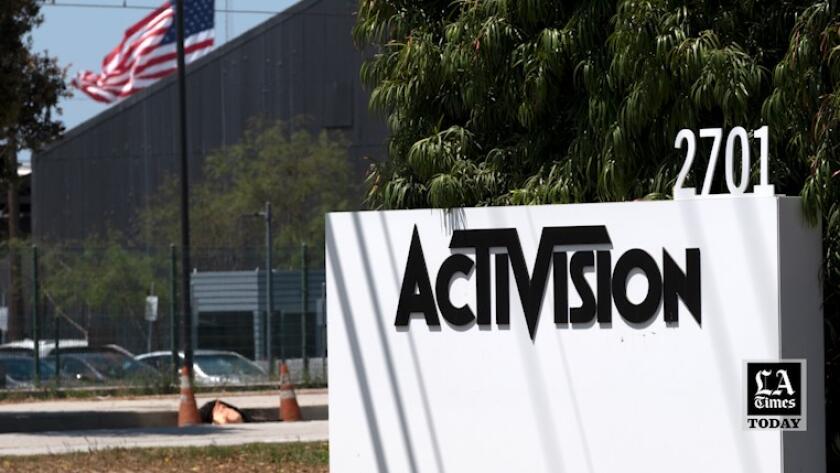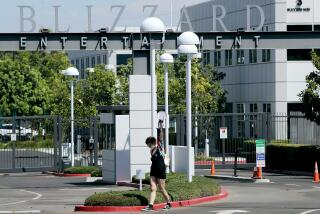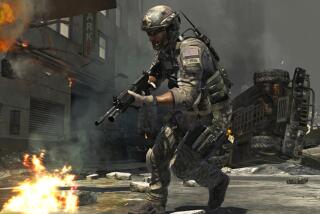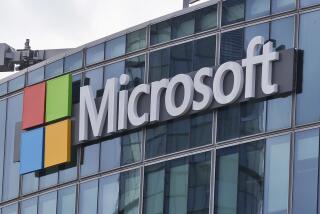Microsoft acquires Activision Blizzard in $69-billion gaming deal
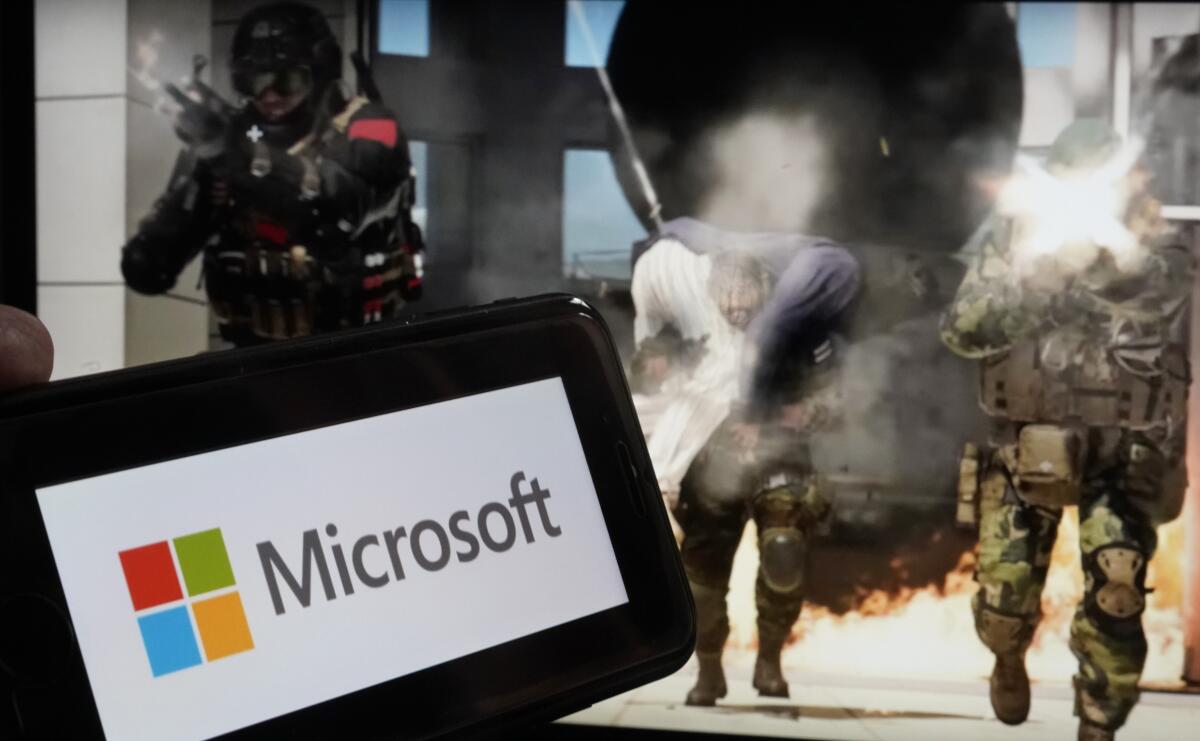
Microsoft acquired gaming giant Activision Blizzard on Friday, closing the biggest deal in video game history after more than a year of close scrutiny from antitrust officials around the world.
The announcement came after Microsoft cleared a final regulatory hurdle to the deal from Britain’s competition watchdog.
The $69-billion purchase of Santa Monica-based Activision Blizzard makes Microsoft the third-largest gaming company in the world by revenue, behind China’s Tencent and Sony in Japan.
First announced in January 2022, the deal faced heavy scrutiny from regulators in the European Union, United States and United Kingdom who argued that the acquisition could raise prices for gamers and harm competition in the gaming industry, including in cloud-based gaming. In total, more than a dozen countries reviewed the acquisition.
Microsoft President Brad Smith said in a statement the combination “will benefit players and the gaming industry worldwide.”
The purchase, seen as a test of whether international regulators would approve such blockbuster tech deals, comes as the growing global games market is expected to generate nearly $188 billion in revenue in 2023 — up 2.6% from last year, according to Amsterdam-based industry tracker Newzoo.
In an email to staff, Activision Blizzard Chief Executive Bobby Kotick said that he would stay with the company through the end of the year.
“Combining with Microsoft will bring new resources and new opportunities to our extraordinary teams worldwide,” Kotick said. “It will also enable us to deliver more fun, more joy, and more connection to more players than ever before.”
Microsoft’s bid is part of a years-long consolidation trend in the video game industry that has shifted power away from game makers into the hands of platform holders, said Joost van Dreunen, author of “One Up: Creativity, Competition, and the Global Business of Video Games.”
“Microsoft is trying to redraw the boundaries or the definition of what the games industry looks like,” Van Dreunen said. “In a conventionally sort of console-based universe, they now have console, PC, mobile and the cloud. It allows them to compete on their strengths.”
In purchasing Activision Blizzard, Microsoft will boost its mobile gaming presence by adding “Candy Crush” and “Call of Duty Mobile” to its arsenal at a time when mobile is gaming’s most significant segment by consumer spending.
With the acquisition completed, Microsoft said that it will begin the process of making Activision, Blizzard and King’s library of games available on Xbox’s Game Pass and other platforms.
Van Dreunen said that closing the deal could have a ripple effect across the industry, leading other corporations to look at what they might be able to acquire in order to compete.
“What’s going to happen to Electronic Arts? It’s worth $35 billion. That’s nothing compared to what they are about to close,” he said, referring to the Redwood City, Calif.-based video game company. “I would not be surprised if the top 10 companies in the games industry, five years from now, would be exclusively platform holders.”
The industry’s landscape has vastly changed over the last decade, he said. Several large companies — including Microsoft — acquired other game studios over the course of the pandemic, when the industry skyrocketed as people stayed home.
Microsoft announced its plan to acquire gaming company Zenimax for $7.5 billion in 2020. Two years later, Sony purchased game developer Bungie for $3.6 billion, while Take-Two Interactive bought mobile game giant Zynga for $12.7 billion. Microsoft revealed it would buy Activision Blizzard that same year.
The move came amid a crackdown on tech mergers by U.S. Federal Trade Commission Chair Lina Khan, who has opposed the Activision acquisition. But a federal judge in San Francisco ruled earlier this year that the FTC hadn’t shown that the deal would harm competition for gaming.
Instead, the court said, evidence pointed to the deal granting more consumer access to games by keeping Activision’s popular “Call of Duty” series on PlayStation for 10 years, agreeing with Nintendo to bring “Call of Duty” to Switch and signing deals to bring Activision’s content to several cloud gaming services for the first time.
Still, the FTC has said that it will resume its administrative case against the deal even after it closes.
The U.K.’s Competition and Markets Authority also initially blocked the acquisition, before regulators accepted a restructured deal that transferred cloud streaming rights for current and new Activision Blizzard PC and console games released over the next 15 years to Ubisoft Entertainment, a global game publisher.
Under the new agreement, Microsoft won’t be able to release Activision Blizzard games exclusively on its own cloud streaming service, Xbox Cloud Gaming, or to exclusively control the licensing terms of Activision Blizzard games for rival services.
“The new deal will stop Microsoft from locking up competition in cloud gaming as this market takes off, preserving competitive prices and services for U.K. cloud gaming customers,” the British watchdog said.
The European Commission approved the deal in May, calling it pro-competitive.
The purchase is not the first in Activision’s history.
The company, founded in Sunnyvale, Calif., in 1979, launched after game developers left Atari over labor issues and recognition for their work.
By the late 1990s and early 2000s, the business that began in a California garage had made moves that would propel it to the top of the gaming world. Activision purchased dozens of companies, including game developers Raven Software, Treyarch and Infinity Ward.
The company merged with Irvine-based Blizzard Entertainment in 2008 in a $19-billion deal, the largest merger or acquisition in the video game industry at that time, making it Activision Blizzard.
Activision Blizzard then bought itself out from under French media company Vivendi for about $8 billion in 2013, before acquiring “Candy Crush” publisher King Digital Entertainment for $5.9 billion in 2016.
This latest transaction with Microsoft came after a protracted series of labor disputes in which Activision Blizzard employees alleged that the company harbored a hostile, sexist, discriminatory workplace — something that Activision Blizzard has denied.
California’s Department of Fair Employment and Housing filed a lawsuit against the video game maker, and some employees sued.
A settlement with the federal Equal Employment Opportunity Commission led Activision to establish an $18-million fund for workers who experienced sexual harassment or discrimination at the company, among other types of workplace misconduct. The company denied all wrongdoing.
“Activision is a long way off from its renegade origins,” said Laine Nooney, assistant professor of media industries at New York University. “The founding of Activision was a real punch up to corporate power. Now it’s hard to imagine a game company more corporate than Activision proper.”
Microsoft has expressed ambitions in changing that piece of the company’s culture after taking a different tack with labor and recognizing a union of quality assurance workers formed under the Communication Workers of America.
On Friday, the CWA said the acquisition would improve working conditions in the game industry because Microsoft will remain neutral should Activision Blizzard employees express interest in joining a union.
It’s not clear what the deal means for gaming culture, Nooney added. Acquisitions, they said, aim to create benefits for consumers in the form of lower prices. But Microsoft has already increased the cost of Game Pass, the Xbox subscription service.
And although the Activision acquisition is mainly about Microsoft centralizing platform power, Nooney said, console loyalties die hard.
“The most common video game platform owned by the young generation I teach isn’t a PlayStation or an Xbox — it’s a Switch,” they said. “Microsoft can’t predict its own future. It’s simply hoping that this acquisition will better tilt the plane in its direction.”
Watch L.A. Times Today at 7 p.m. on Spectrum News 1 on Channel 1 or live stream on the Spectrum News App. Palos Verdes Peninsula and Orange County viewers can watch on Cox Systems on channel 99.
More to Read
Inside the business of entertainment
The Wide Shot brings you news, analysis and insights on everything from streaming wars to production — and what it all means for the future.
You may occasionally receive promotional content from the Los Angeles Times.
